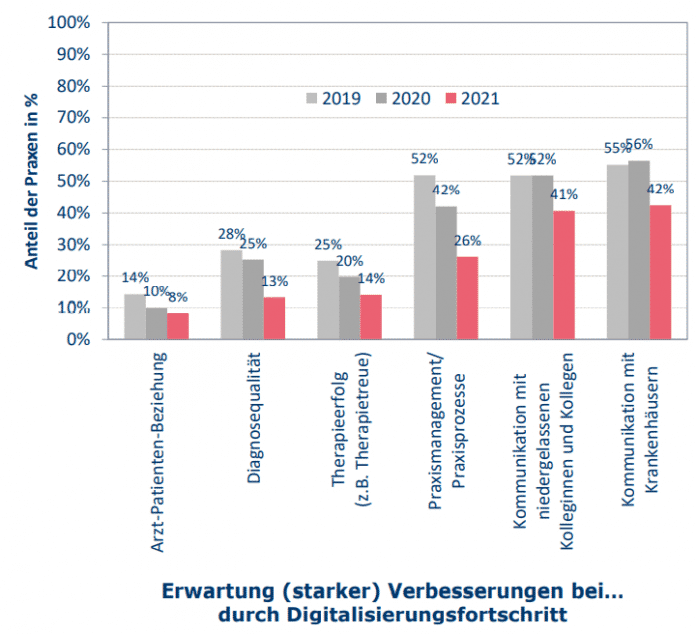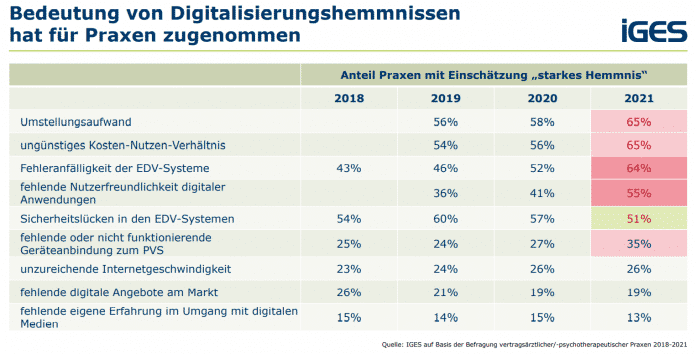Due to recurring failures and disruptions in the introduction of the e-prescription and the connection to the telematics infrastructure (TI), disappointment is spreading among resident doctors and psychotherapists, as can be seen from the practice barometer “digitization” of the National Association of Statutory Health Insurance Physicians (KBV). KBV board member Dr. Thomas Kriedel has a clear answer as to why digitization has not yet arrived in practices: “Because it doesn’t work”. The doctors are even considering leaving Gematik.
Kriedel criticized the fact that the KBV, as a shareholder in Gematik, only had 7.4 percent of the votes. In contrast, the Federal Ministry of Health has the majority of votes with 51 percent, as Apotheke adhoc writes. “For us, the political question is whether we will still participate in Gematik if we are always outvoted.”
“Convince with benefits instead of with a crowbar”
The KBV demanded that an electronic prescription should be less complicated than a paper prescription. But the opposite is the case: “Today, issuing a prescription takes two to three seconds, it’s a mass process that runs smoothly,” explains KBV Vice Dr. Stephen Hofmeister. “For the e-prescription, on the other hand, 40 to 50 seconds have to be estimated. Any controller would scream at something like that.” According to Hofmeister, the cash registers or pharmacies may benefit from the e-prescription, but not the doctor’s office or the patient. “Convince with benefits instead of with a crowbar – that would be a political paradigm shift, which we as the National Association of Statutory Health Insurance Physicians are happy to support.”
Test phase too short – Frustration inevitable
“In order not to jeopardize the legally announced introduction date, it was accepted that a procedure that was proven not to work properly would be used in the practices,” Hofmeister continued to criticize.
The high time pressure of the retired Health Minister Jens Spahn (CDU) did not advance digitization, but massively hindered it: “The ignorance of those politically and technically responsible has consequences: The expectations of the practices of digitization have really collapsed,” Hofmeister continued. According to Hofmeister, recurring “technical failures”, immature applications, high costs and time expenditure, a few supply-related benefits” and the “pushing through of implementation deadlines” by the CDU minister led to “tangible and measurable frustration”.

Digitalization practice barometer: expectations of digitalization
(Image: KBV)
Kriedel was annoyed about the current problems caused by the new versions of the electronic health card 2.1: “And now a new highlight of the farce: the paralysis of card terminals through to the practice system through the combination of eGK, winter weather and wool sweaters!”. Electrostatic charges are currently causing massive disruptions to some card terminals, so that they often have to be restarted. But this is just the tip of the iceberg: According to Kriedel, there have been a total of 3,850 hours of failures and disruptions in connection with the telematics infrastructure within 13 months in the past.

Increase in the importance of digitization barriers for practices
(Image: KBV)
Policy change required
The KBV warned of an expected crash […], if the use of the e-prescription had become mandatory on January 1 of this year”. Hofmeister hopes that Federal Minister of Health Lauterbach will initiate a change of strategy. After all, according to the coalition agreement, the new government wants “a special focus on solving supply problems and the perspective of users and users”. Kriedel also appealed to those responsible: “to politicians, to gematik, to industry and also to the health insurance companies, whose task it is to educate their insured about eRezept, eAU, ePA & Co.” Much too many insured persons still have “no idea” about the subject.
In contrast to the introduction of the e-prescription, the electronic patient file and the electronic notification of incapacity to work, which was forced by the legislature, video consultation hours introduced voluntarily would work much better and enjoy greater acceptance among doctors. About a fifth of the practices would offer the option of making appointments online – according to the practice barometer, it was 41 percent of the large practices.
Association of Statutory Health Insurance Physicians in Bavaria started a petition
The Bavarian Association of Statutory Health Insurance Physicians (KVB) had started a petition in which they called for a one-year test phase for the introduction of TI applications such as electronic certificates of incapacity for work or electronic prescriptions – all users should also be able to participate voluntarily. In addition, alternative procedures should always be possible in the event of technical faults in order to be able to maintain regular operations in the practices.
[Update 22.01.22, 12:00 Uhr: Seit Ende Dezember befindet sich die Petition “Kassenarztrecht – Einführung von Flächentests zur elektronischen Arbeitsunfähigkeitsbescheinigung und zum eRezept” mit 53.751 Mitzeichnern in der Prüfung.]
(mack)
